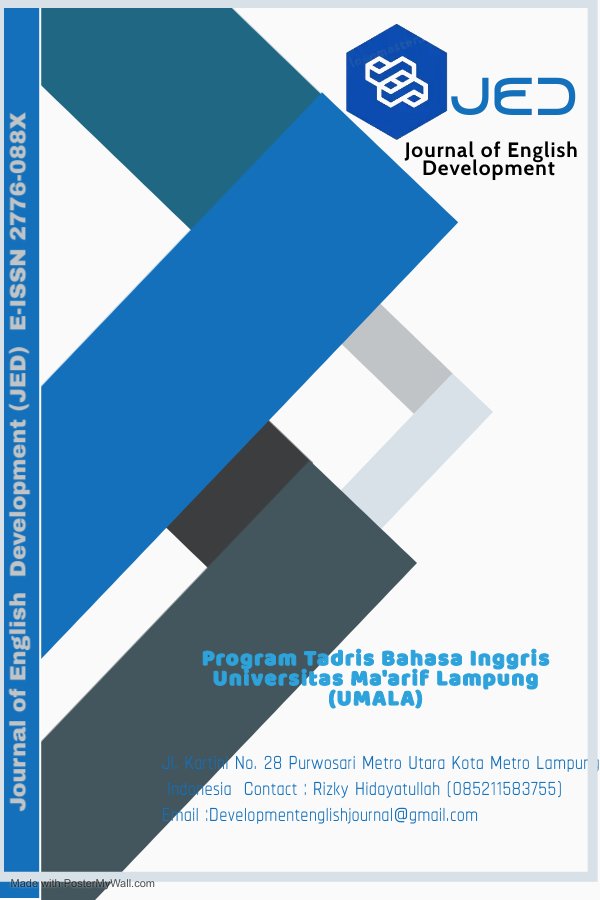Developing English Book for X TKR of Vocational High School Based on Contextual Purposes
English
DOI:
https://doi.org/10.25217/jed.v4i02.3644Keywords:
English Book, Vocational High School, Contextual purposes, Independent CurriculumAbstract
This research aims to develop an English book for X TKR of Vocational High School by implementing an Independent curriculum. Base on the result of need analysis with students and interviews with English teacher, the researchers find the problem that SMK Darul Huda Blitar implementing independent curriculum but do not have patent materials for learning English using the independent curriculum. The product was created using the R&D approach with five stages of ADDIE model: analysis, design, development, implementation, and evaluation. In this study, the research instruments and data sources were from need analysis questionnaire, interview guidelines, and student satisfaction questionnaire. The results of research show that English learning books accompanied by illustrations, a little material and equipped with practice can increase understanding and enthusiasm in lessons. Based on the results of a student satisfaction questionnaire filled out by 19 students after using English books for contextual purposes, the score reached 96%, which means this media is very good for use in increasing interest and understanding in English lessons.
References
A. Prabowo, and H. Heriyanto. 2013. “Analisis Pemanfaatan Buku Elektronik ( E-Book ) Oleh Pemustaka Di Perpustakaan SMA Negeri 1 Semarang.” Jurnal Ilmu Perpustakaan 2, no: 152–61.
Amrina, Hafidza Nash’ul, and Latifah Anom. 2019. “Developing English Materials Based on Character Building for Management Class in Stie Cendekia.” Jo-ELT (Journal of English Language Teaching) Fakultas Pendidikan Bahasa & Seni Prodi Pendidikan Bahasa Inggris IKIP 6(2): 69.
Creswell, J. W. 2012. Educational Research: Planning, Conducting, and Evaluating Quantitative and Qualitative Research. 4th editio. Pearson Wducation, Inc.
Floden, Robert E. 2006. Meaningful Learning Using Technology. Amsterdam, New York: Columbia University Press. New York, London: Teacher College Press, Columbia University.
Gan, Chloe. 2023. “English Language Skills in the Workplace.” Cambridge University Press & Assessment.
Heale, Roberta, and Alison Twycross. 2015. “Validity and Reliability in Quantitative Studies.” Evidence-Based Nursing 18(3): 66–67.
Kennedy, Mary M. 1997. “The Connection between Research and Practice.” Educational Researcher 26(7): 4.
Kiczkowiak, Marek. 2019. “Seven Principles for Writing Materials for English as a Lingua Franca.” ELT Journal 74(January): 1–9.
Lin, M.C & Chiu, T.L. (2009). 2009. “The Impact of an Online Explicit Lexical Program on EFL Vocabulary Gains and Listening Comprehension.” JALT CALL: 3–14.
Mardapi, D. 2004. “Pengembangan Sistem Penilaian Berbasis Kompetensi. In Seminar Nasional Rekayasa Sistem Penilaian Dalam Rangka Meningkatkan Kualitas Pendidikan.” HAPY Yogyakarta Vol. 26.
Mubarok, Tyas Alhim, Ahmad Saifudin, and Siti Rofiah. 2020. “Pengembangan Modul Pembelajaran Berbasis Kontekstual Untuk Meningkatkan Kemampuan Pronunciation Mahasiswa Pendidikan Bahasa Inggris.” Briliant: Jurnal Riset dan Konseptual 5(1): 36.
Noer, Salman M. 2020. “Development of English English Based on Contextual Instruments in Improving Student Competency of Automotive School Smk Muhammadiyah Padang.” Journal JIPS 1(1): 28–34.
Prayoga, Andri, Dedi Irwansyah, and Trisna Dinillah Harya. 2021. “Developing English Learning Materials for Computer Network Engineering Students at Peripheral Indonesia.” EduLite: Journal of English Education, Literature and Culture 6(1): 28.
Sudjana. 2005. Metode Statistik. Bandung: Tarsito.
Sugiyono. 2015. Metode Penelitian Kuantitatif Kualitatif Dan R&D. Alfabeta.
Suharto, Ririn Pratiwi, Istina Atul Makrifah, and Widiarini Widiarini. 2020. “Analisa Kebutuhan Buku Ajar Bahasa Inggris SMK Jurusan Usaha Perjalanan Wisata.” Briliant: Jurnal Riset dan Konseptual 5(1): 19.
Sujarweni, Wiratna. 2014. SPSS Untuk Penelitian. Yogyakarta: Pustaka Baru Press.

Downloads
Published
How to Cite
Issue
Section
License
Copyright (c) 2024 Ita Nurhasanah, Istina Atul Makrifah, Tyas Alhim Mubarok

This work is licensed under a Creative Commons Attribution-ShareAlike 4.0 International License.





